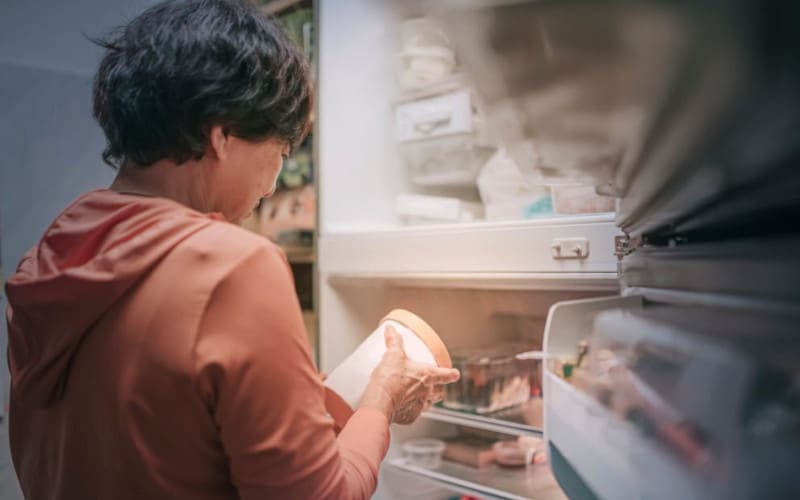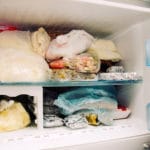If you’re experiencing problems with your LG freezer not freezing, you may feel frustrated and helpless. Thankfully, there are a few things you can do to try to fix the problem.
In this article, we will discuss some of the most common causes of this issue and provide tips on how to troubleshoot them. We will also outline some steps that you can take to prevent your freezer from experiencing this problem in the future.
Solution 1: Check the Temperature Settings
One of the most common reasons why an LG freezer may stop freezing is because the temperature settings have been changed. If the freezer is set to a warmer setting, it will not be able to adequately freeze food.
To check the temperature settings, open the freezer door and locate the temperature control knob. It is usually located on the inside wall of the freezer near the door.
Turn the knob to the left to decrease the temperature and to the right to increase it. If the freezer is set too low, it will stop freezing altogether.
Solution 2: Inspect the Door Seal
Another reason why your LG freezer may not be freezing properly is that the door seal is damaged. A damaged door seal can cause warm air to enter the freezer, which will prevent the food from freezing.
To inspect the door seal, close the freezer door and look for any gaps or cracks. If you see any, use a cloth or your finger to feel for any cold air that may be escaping.
If the seal is damaged, it will need to be replaced. Contact a qualified appliance repair technician to do this for you.
Related: How to Fix LG Refrigerator Not Cooling
Solution 3: Check the Condenser Coils
If the condenser coils are dirty, they will not be able to properly cool the air. This can cause the freezer to stop freezing.
To clean the coils, unplug the freezer and remove the food. Pull the freezer away from the wall and locate the coils. They are usually located on the back of the freezer near the bottom.
Use a vacuum cleaner with a brush attachment to clean any dirt or dust off of the coils. Be sure to unplug the freezer before doing this.
Solution 4: Replace the Start Relay
The fridge/freezer compressor is powered by the start relay, which also acts as a switch. If the start relay fails, the compressor will not operate. The freezer will not be cold if the refrigerator/freezer compressor won’t turn on or run properly.
Unplug the freezer and check for continuity between the start and run terminals with a multimeter. If the multimeter does not read continuity, replace the start relay.
Solution 5: Replace the Temperature Control Board
The temperature control board regulates the power to the compressor and the fan. If the temperature control board is faulty, it may not provide enough power to the compressor or it may cause the freezer to overcool.
If you suspect that the temperature control board is faulty, replace it with a new one.
Solution 6: Replace Any Damaged Parts
If you have tried all of the solutions above and your freezer still isn’t freezing, there may be a problem with one of the parts. A broken evaporator fan or a damaged compressor can cause the freezer to stop working.
If you suspect that there is a problem with one of the parts, contact a qualified appliance repair technician to diagnose the issue. They will be able to replace any damaged parts and get your freezer working again.
Solution 7: Replace the Thermostat
If the thermostat is faulty, it will not be able to properly control the temperature in the freezer. This can cause the freezer to stop freezing.
To replace the thermostat, unplug the freezer and remove the food. Locate the thermostat and use a screwdriver to remove it.
Install the new thermostat and screw it into place. Be sure to unplug the freezer before doing this.
Solution 8: Replace the Compressor
The compressor compresses the refrigerant and circulates it through the evaporator and condenser coils. The freezer will not cool if the compressor fails. This is, however, a rare occurrence.
Check all of the more common defective parts first before replacing the compressor. If you’ve determined that all of the other components are in good working order, check the compressor.
To test the compressor, unplug the freezer and use a multimeter to check for continuity between the two terminals. If the multimeter does not read continuity, replace the compressor.
Solution 9: Leak in the Sealed System
If the freezer only has one shelf freezing or just one portion of the evaporator coil icing up, there might be a leak in the system. Repairs to a sealed system are frequently costly.
If your sealed system is leaking, you’ll almost certainly need to replace the freezer.
Solution 10: Replace the Condenser Fan Motor
The condenser fan motor helps the refrigerator to cool. If the condenser fan motor isn’t working, the refrigerator won’t cool. You can check if the fan blades are free and spinning by looking at them.
If the fan blades do not turn freely, the fan motor bearings are worn out and should be replaced. If there are no obstructions and the fan blades rotate freely, use a multimeter to check for continuity in the fan motor.
Replace the condenser fan motor if it does not have continuity.
Related: LG Refrigerator Modes
Solution 11: Replace the Defrost System
The defrost system is the most common reason for this problem. The defrost heater, which is activated several times throughout the day to melt any frost that may have accumulated on the freezer evaporator coils, turns on.
Frost will continue to accumulate on the evaporator coils if the defrost heater won’t turn on, and they will eventually ice over.
To test the defrost system, check the continuity of the defrost heater. If there is no continuity, replace the defrost heater.
Solution 12: Call a Professional
If you have tried all of the solutions above and your freezer still is not freezing, it is best to call a professional. Appliance repair technicians have the knowledge and experience to properly diagnose and fix the problem.
Conclusion
We hope that this article has helped you troubleshoot the problem with your LG freezer. If your freezer is still not working properly, contact a qualified appliance repair technician for assistance.






